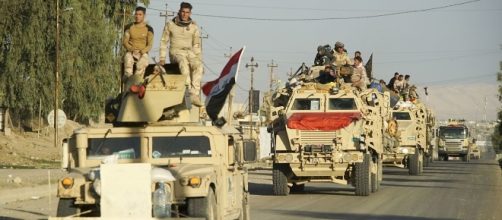Pentagon officials told reporters on Friday that earlier this week, US forces killed the leader of ISIL in Afghanistan, Abu Sayed, in a strike on the headquarters of ISIL-Khorasan, the Islamic State's Afghanistan branch.
US Secretary of State James Mattis told reporters that killing their leader "sets [ISIL-K] back" and gives US forces operating in the region an advantage over the group.
The strike comes less than a week after Iraqi Prime Minister Haider al-Abadi declared "total victory" over ISIL in Mosul. With ISIL's strength and influence diminishing across the Middle East and in Afghanistan, it seems that ISIL's reign of terror is almost at an end.
The battle for Mosul
When the Islamic State of Iraq and the Levant first started making headlines in 2014, the world watched as large parts of the Middle East were swallowed up by some of the most violent extremism seen in years. Since then, ISIL has been seen as one of the primary factors threatening the stability of the MIddle East.
However, US-led coalition forces, including fighters from Iraq, Jordan, and several other US-backed Middle Eastern countries, have largely reduced the military power and influence ISIL has in the region.
Last October, the infamous Battle of Mosul began. The battle saw ISIL combatants locked in a bloody battle against forces from Iraq, Kurdistan, Iran, and even the Lebanese armed group Hezbollah.
The battle, nicknamed Operation "We are Coming, Nineveh," was a major military campaign that started with the objective to take back Mosul from ISIL. ISIL captured the city in their initial power grab in the summer of 2014 and has retained the territory since then. After almost nine months of intense fighting in the city, Iraqi Prime Minister Haider Al-Abadi declared victory against the so-called Islamic State on July 10, 2017.
The Battle for Mosul has left thousands dead and the city in ruins. According to UN reports, fixing the Old City will cost over $1bn. Attempting to replace the infrastructure and removing the non-detonated explosives from Mosul will cost over $50bn. Iraqi Prime Minister Haider al-Abadi plans on making deals with Guld Arab countries to cover redevelopment costs.
American commanders on the ground have claimed that the close combat in Mosul has been some of the most difficult urban fighting since WWII.
Maj. Gen. Sami al-Aradi, a commander of Iraqi Special Forces told reporters, "I've never seen anything like the battle for the Old City. We have been fighting for each meter. And when I say we have been fighting for each meter, I mean literally."
The Syrian Democratic Forces have launched their own military campaign against ISIL in Raqqa, the Islamic State's de facto capital. The siege has been supported by US-led coalition airstrikes. Experts believe that Raqqa will be liberated from ISIL control within the next few months.
The end of ISIL?
Are we witnessing the end of the so-called Islamic State?
Maybe.
With the Battle for Mosul over and the Battle of Raqqa underway, many analysts believe that ISIL is facing the end of its reign. Not only has it lost much ground, but ISIL combatants are fleeing ISIL territory and deserting their posts.
ISIL has even seen losses economically, losing 80 percent of its income in the past two years, according to IHS Markit. The financial services firm claims that the decrease of revenue comes mainly from the reduction in oil sales and tax revenue that stems from their loss of land.
However, security experts warn of ISIL's international appeal. Independent groups that have pledged loyalty to ISIL still survive overseas, as we have seen in the Philippines and parts of Africa.
Although ISIL is seemingly defeated in the Middle East and may soon no longer threaten regional stability or international security, splinter groups and lone wolf acts may still prove to be of concern.


